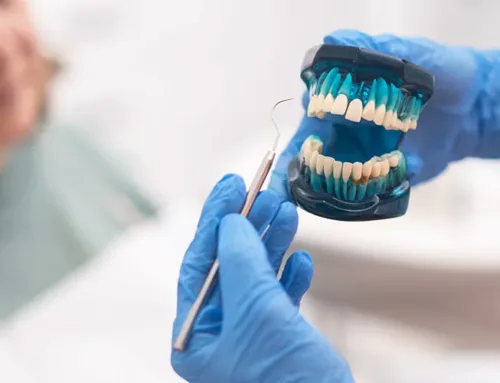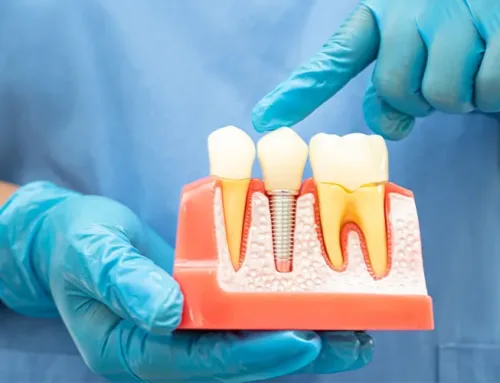Dental Hygiene and Mental Health
August 19, 2022
While dental hygiene is often viewed as an isolated topic – something that only impacts our oral health, there is a growing body of research that suggests that there is a strong, cyclical connection between our dental hygiene and our mental health.
In this blog post, we’ll explore the relationship between these two, and outline how one can affect the other and vice versa.
By understanding how these two are interconnected, we can work in ways that lower the negative impact that can stem from having poor dental hygiene, poor mental health, or both.

What Is Dental Hygiene?
In short, dental hygiene is the practice of keeping your teeth clean by brushing, flossing, and actively choosing to attend regular dental check-ups. When you go to the dentist for a professional cleaning (usually every 6 months), your dental hygienist can give you tips on how to care for your teeth and gums, as well as, update you on the overall health of your mouth.
What Is Mental Health?
Our mental health comprises our emotional, social, and psychological well-being. It plays an essential role in every stage of our life, and if you experience mental health problems or illnesses along the way, your thinking, mood, and behavior can be affected.
What’s the Connection Between Dental Hygiene & Mental Health?
According to research published by the Canadian Journal of Psychiatry [1], a significant interaction exists between dental hygiene and mental health. With poor dental hygiene, severe dental issues such as tooth loss, cavities, enamel erosion, and even speech impediments can occur if brushing, flossing, and routine check-ups are neglected. Not only are these conditions physically damaging to your oral health, but they can, in turn, cause one to develop dental phobias, low self-esteem, anxiety, and even depression.
This can lead to a negative cycle, where these new mental health conditions cause you to neglect your teeth and gums even further.
On the other side, those who have pre-existing mental illnesses can find themselves with poor dental health just simply due to struggling with their illness. Examples of this include:
- Those with social anxiety may avoid going to the dentist completely, due to feeling embarrassed about the state of their teeth or are paralyzed from the fear of negative judgment.
- Those with depression may find it very difficult to take care of themselves properly, leading to unavoidable poor habits such as irregular flossing and brushing [2], skipping meals entirely, or eating and drinking sugar-filled foods because they are the only things that are easy to handle at the time.
- Those with bipolar disorder may develop the habit of brushing their teeth too vigorously, which leads to enamel erosion [3]. Over brushing can also lead to dental abrasions, mucosal lacerations, and gingival lacerations.
- Individuals with schizophrenia may neglect their oral hygiene due to hallucinations or delusions that tell them not to brush and floss their teeth.
- Individuals with eating disorders may develop more oral infections than others, due to a lack of getting proper nutrition. Without the right nutrition, your immune system suffers. Those who vomit are more susceptible to tooth decay due to the effects that stomach acid has on your tooth enamel [4].
The Impact of Mental Health Medication & Your Oral Health
Those who are under medication treatment for their mental health condition may find their dental health in decline even if they participate in active dental hygiene practices. This is because some medications, like antidepressants, antipsychotics, and mood-stabilizing treatments, are more likely to cause dry mouth (xerostomia) [5]. In severe cases, oral bacterial infection can occur, leading to gum disease.
How COVID-19 Has Exacerbated Stress-Related Mental Health Conditions
For many, the COVID-19 pandemic has caused immense stress, anxiety, and has either caused a decline in mental health or exacerbated pre-existing mental health conditions. According to the American Dental Association (ADA), the negative mental health impact of the COVID-19 pandemic has given rise to more stress-related dental health problems. Their poll found a 71% rise in teeth grinding and clenching, 63% rise in cracked/chipped teeth, and 62% increase in temporomandibular disorder (TMJ) symptoms [6].
Creating a Positive Foundation for You
If you are struggling with maintaining routine dental visits, or are finding that your mental health is suffering due to dental hygiene issues, please get in touch with us here at Tampa Palms Dentistry. Our dental services are centered around what is healthy for you, and what you need, which is why we’d love to talk with you about where to start in creating a positive foundation for your dental hygiene.
By encouraging actionable, sustainable steps, we can create balance and harmony between your dental hygiene and mental health. You can give us a call at (813) 333-1922, contact us via our website, or schedule a consultation online.








